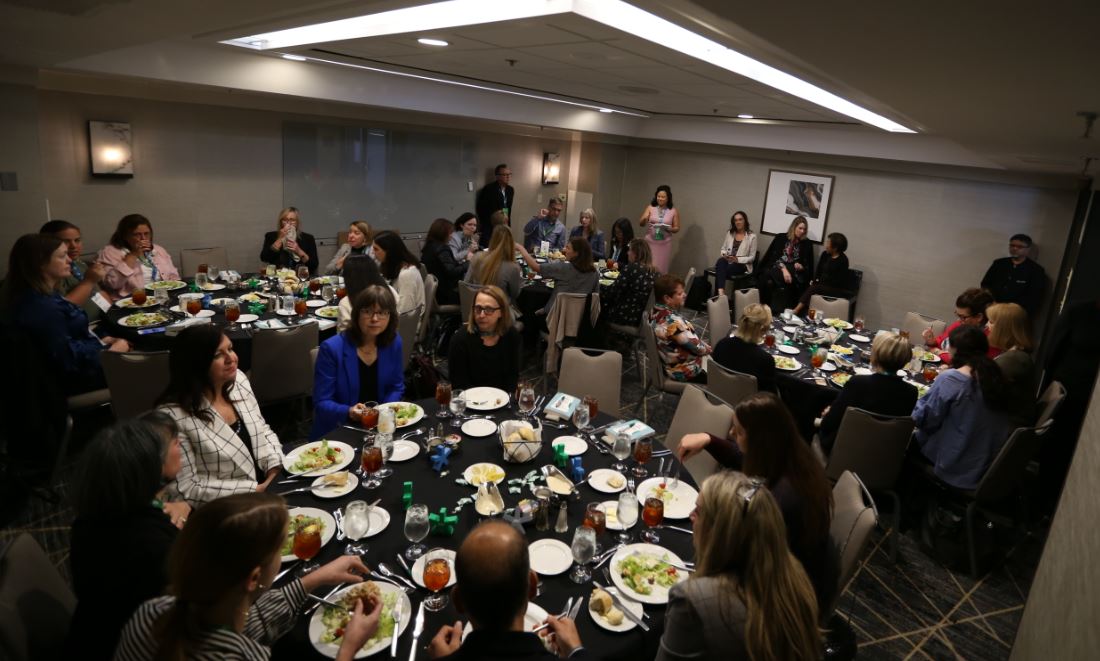Inspiring Women in Localization Panel Offers Tips for Success
28 Oct 2019
3 min read

As a part of its annual SDL Connect event, SDL hosted a Women in Localization luncheon on Thursday, October 10th, to celebrate women in the localization industry and commemorate SDL’s platinum sponsorship of the organization.
SDL’s landmark support is the largest that Women in Localization has received to date and underscores SDL’s ongoing commitment to advancing women and supporting diversity worldwide. The luncheon featured a panel discussion on overcoming global communication challenges and enabling women to thrive in their careers. The three panelists offered wisdom gained from their varied and extensive experience working for some of the world’s largest brands. The distinguished panelists included:
- Author and Founder, Anna Yen, who spearheaded investor relations efforts for industry leaders like Tesla Motors, MarketWatch and Pixar Animation Studios.
- Social Media Pioneer and C-Level Entrepreneur, Lisa Stone, who has used technology to create and scale consumer movements and communities having founded BlogHer, Women.com and Law.com, among others.
- Brand Strategist and Founder, Sara Schor, who has provided insights and strategy to small and large brands.
Managing workplace conflict
The panel’s discussion kicked off with the thorny topic of handling conflict in the workplace.
Yen and Stone emphasized that direct communication is the most effective way to resolve workplace issues. However, while this seems obvious, it’s not always done since many prefer to avoid conflict. Yen and Stone said that instead of going to a person’s manager or going to your manager to discuss an issue, talking directly is the best way to find resolution.
Schor shared several useful strategies that she regularly uses:
- Respond, don’t react. How many times have you fired off an email without thinking, only later to realize you said something you shouldn’t have? When you feel yourself reacting without thinking, Schor suggests taking a little time to think through your response. Try typing a draft (without putting any email addresses in the “To” field, just in case) and letting the reply sit overnight since things can often look different in the morning.
- Take three deep breaths. When faced with conflict, Schor said your body’s fight or flight response automatically kicks in. Taking a few deep breaths gives your body time to relax, reduces the fight/flight instinct and helps you respond appropriately.
- Remember difficult things and how to positively overcome them. Schor shared the story behind a blog called “How a Password Changed My Life” by Mauricio Estrella. Depressed and in the middle of a divorce, Estrella used his password as a tool to find forgiveness. Typing “Forgive her” every day - sometimes multiple times a day - for one month had an unexpected healing effect.

Effective communication in the workplace
According to Psychology Today, women use twice as many words when communicating than men. On average, women speak 250 words per minute vs. 125 for men, and over the course of a day, women speak 25,000 words compared to 12,000 for men. Communication styles are also very different depending on gender. These differences were explored by the panel, who offered recommendations on better ways to communicate.
Yen, Stone and Schor offered several tips for effective communication, especially around email:
- Think about the email recipient, what is their pain point? Knowing this will focus your email.
- Consider the recipient’s attention span and try to formulate your message so they can reply with a simple “Yes” or “No”. You could lose the reader’s attention if the email is too long.
- Use bullet lists to simplify information sharing.
- Use keywords in your subject line like “Reply Needed”, “Action Required” or “This is Interesting”.
- As an email thread grows and the topic evolves, change the subject line so it’s relevant to what’s being discussed.
- Put questions or requests in bold to draw attention.
Yen stressed that while broadcasting your message is important, anticipating people’s responses is just as important. Focus on your target, whether it’s your customer, colleague or manager, and proactively consider their objections so you can be prepared to respond.
All three panelists agreed that the foundation of successful communication is strong storytelling. When creating a message for customers, internal colleagues or upper management, craft a narrative to express your vision. A simple yet powerful technique is described in Nancy Duarte’s TED talk The Secret Structure of Great Talks.
Successful branding - when the brand is YOU
As a successful brand strategist, Schor said it’s not only companies that have brands - individuals have personal brands too. When creating your personal brand, consider what makes you unique, what you can offer and include these differentiators in your resume and LinkedIn profile to stand out.
Stone said it’s no longer enough for women to be competent, they also need to be confident, and confidence is a trait that women need to continue to develop.
Stone cited a study from Harvard Business Review that says men apply for a job when they meet 60% of the qualifications, but women apply only if they meet 100%. In the study women said they didn’t apply since they were following the “rules” of the hiring process, reinforcing how girls are socialized to follow rules. More importantly, women said they didn’t want to apply and potentially face failure. In comparison, only 13% of men were concerned with failure.
Stone and Yen emphasized that women must take more risks. While Stone said women tend to suffer more from imposter syndrome, she advised women to “fake it ‘til you make it” when appropriate and said she’s done this several times in her own life.
Yen encouraged women not to take rejection personally, saying that failing and making mistakes is how we learn. “If something doesn’t go your way, who cares?” Yen said, urging women to keep getting back up and never stop trying. Schor developed a system that helps with confidence called “Passion, Authenticity, Layers”. First, she said, know what you’re doing and what you’re talking about (passion). Next, since women often change their personalities to fit a situation, she emphasized it’s critical to be yourself (authenticity). Finally, dressing in layers is how Schor keeps warm in rooms that are too cold and hides sweat in rooms that are too hot.
Most importantly, when women are given a seat at the table, Schor, Stone and Yen all agree that women should take advantage of the opportunity. Speak up with new ideas, offer solutions and remember to disagree with ideas, not people. Reflecting on the different paths they’ve taken in their careers and lives, Yen, Stone and Schor said it is helpful to know the destination when mapping out your path. However, women should remember to enjoy the stops along the way. To quote Ferris Bueller, “Life moves pretty fast. If you don’t stop and look around once in a while, you could miss it.”

